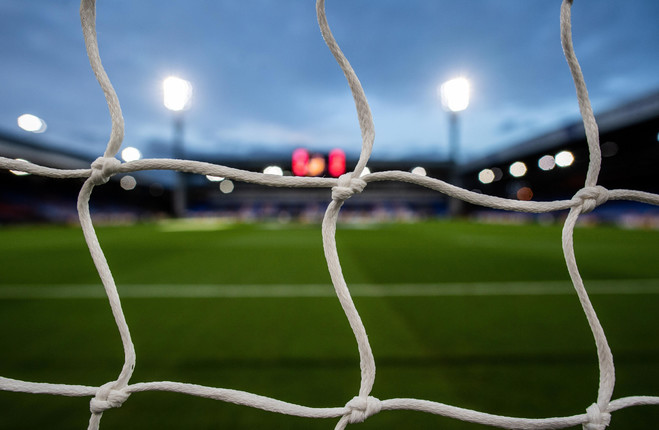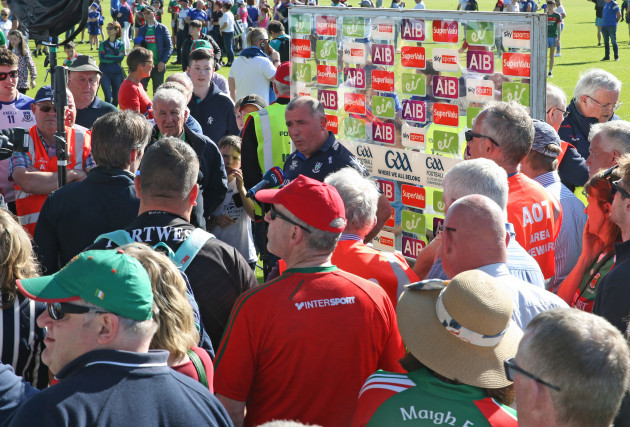1. “Mainly, when you’re leaving a club, the door hits you on the backside,” says Gareth McAuley, the former Northern Ireland international.
“It (the club) still carries on. And it always will carry on. I think for young kids to get their head around that is really important because, really, you’re a commodity in a big industry. It’s brutal, although lots of people don’t see it like that — they just see the end product and the glamour. They don’t see the ruthlessness and how lonely football can be as well. Loads of boys live out of suitcases, constantly travelling.”
McAuley is probably right about us having a rose-tinted view of the game, including the way players depart from clubs.
(€) ‘Abandoned cars and deleted from WhatsApp: What happens when a footballer leaves a club?’ – Stuart James for The Athletic.
2. Robert Goggins takes a moment to think about what it is he does as a volunteer for Shamrock Rovers Football Club.
“Denis?” he says, from the boardroom table in Tallaght Stadium, leaning back with his arms folded.
He directs his voice toward an office in the corner of the room. “What do I volunteer for here in this club?”
“A lot, Robert,” replies the voice of club CEO Denis Donohoe. “A lot.”
“A lot,” Goggins says, nonchalantly.
Goggins is editor of the Rovers match programmes. He has authored five history books on the club.
In more recent years, his concerns have extended to memorialising players at risk of being forgotten, making sure their graves are marked.
Michael Lanigan profiles Robert Goggins, the man who marks the graves of great Shamrock Rovers players long passed, for the Dublin InQuirer.
3. Helping young footballers to maximise their talents is a mission close to Keaney’s heart, not least because of the set-backs she personally suffered. She debuted for the Donegal seniors at 15, won an All-Ireland minor medal in 2009, an Intermediate title a year later and picked up three Ulster senior medals. Yet she still suffered dark days. A seemingly innocuous incident in a challenge game in 2015 resulted in such a serious concussion that she had defer her final exams in the University of Limerick and, in 2017, she tore an ACL (cruciate).
She’s the only girl in a sporty family of high achievers. Her brother Luke played football for Donegal until hip injuries prematurely ended his career and Jack (23), studying maths and biology, currently captains UCD in the League of Ireland. Their maternal grandfather Tom ‘Pook’ Dillon was corner-back on Galway’s legendary All-Ireland winners in 1956 and their mother Deirdre and all her sisters were prominent camogie players from Ahascaragh.
Writing for The Irish Times, Cliona Foley meets Donegal sports scientist Kate Keaney, who is now making waves Stateside.
4. His face boiled up beetroot red, the heat conductors being the inexplicable bodywarmer and the incandescence at the injustices he perceives to have just befallen his team, Seamus McEnaney takes the witness stand in MacHale Park.
The amateur Camille Vasquezes line the questions up. Five minutes and 25 seconds into the cross-examination, the standard end-of-season question hasn’t been asked yet.
Will you be there next year yourself Banty?
“That’s it for tonight, alright, thanks,” he replies.
In and out of the changing room he continues to steam for a while after, the colour gently cooling on him.
Banty was 36 when he first took charge of Monaghan. He’s 54 now, and has just finished the third year of his second stint.
The Irish News’ Cahair O’Kane’s column this week was on inter-county management.
5. You want the best for Shine, after all she has gone through, given addiction is a lifelong journey and there will be few easy days ahead. The book will generate publicity and she is about to enter a period where she will have to recount all this scores of times.
She feels she is ready, and is eager to underline the importance of her work.
“You’d never put someone in professional sports next to addiction,” Shine says. “(People think) it’s only when you’re retired that you can build these addiction issues — when it hits anybody at any given time.”
The Athletic’s Katie Whyatt interviews Clare Shine.


